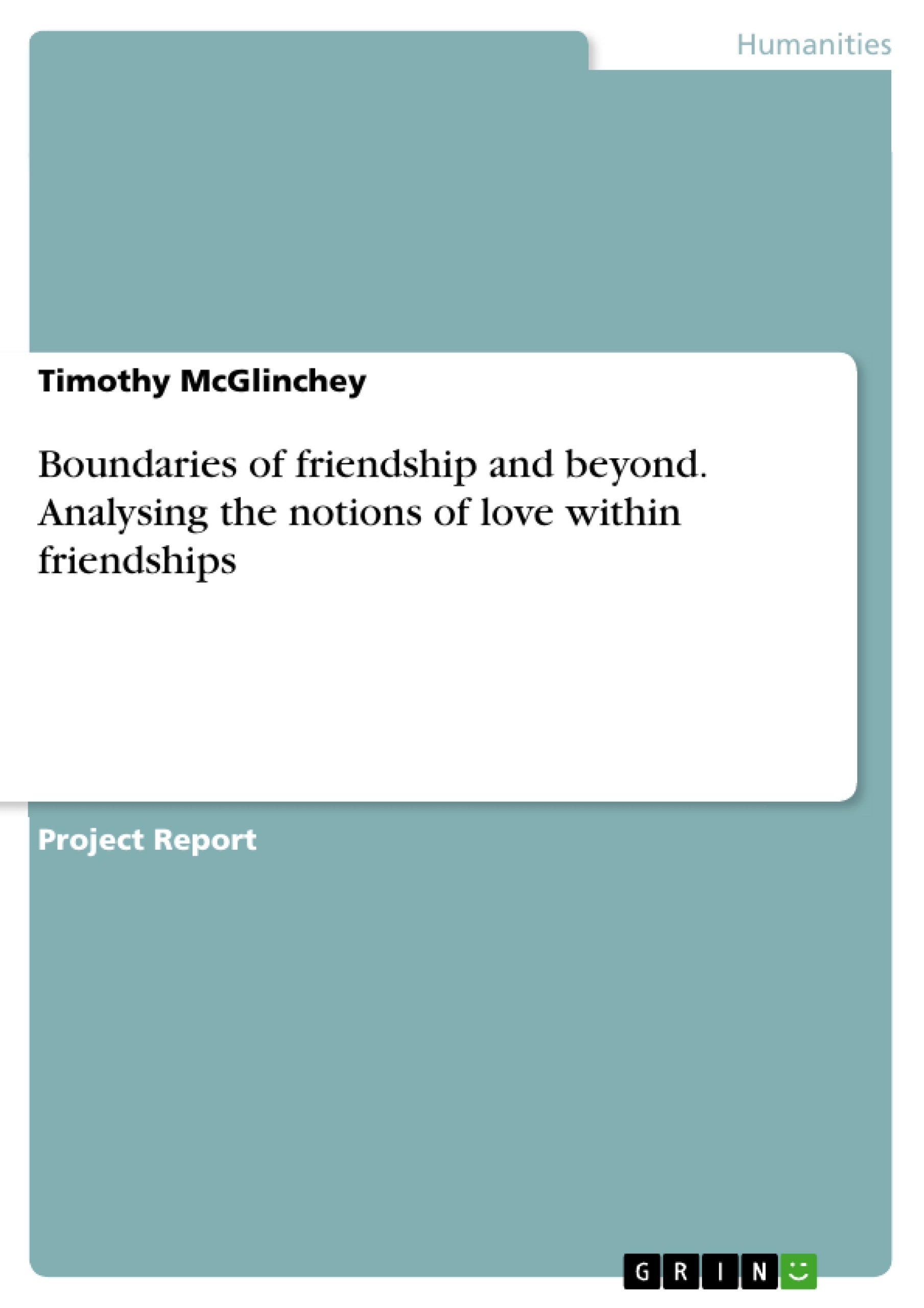First-hand ethnographic research delving into the complex notion of love within friendships. Specifically, this project seeks to outline the boundaries which frame such relationships and the consequences which may arise from their neglect.
In deciding our research project, we were to choose between two main themes: “love” or “grief”. In our first group meeting in class, we decided that we would choose the broad theme of love for a several reasons. It is generally a more positive subject than grief, and so, was simply preferred by the group; it is something almost everyone can personally relate to; and there are many different types of love and so we could approach the project in various ways. For these main reasons, we agreed that love would be our favored theme.
The next course of action was choosing our specific research title. From the suggestions given, there were many different angles we could take. One of these suggestions was “love between friends”. We felt this was a strong idea because it is outside the topic of romantic love, and we were also intrigued to discover more about it ourselves. At first, some within the group, including myself, were concerned that we may struggle to find a unique idea that no one else in the class had chosen, but this was fortunately not the case.
In our next meeting we decided on the main research questions for the topic and the title itself. When we brainstormed as a group we had several ideas, below are the ones we felt were most feasible and most interesting to investigate:
- Boundaries between acquaintance and friend
- Boundaries within friendship
- Boundaries beyond friendship
- Maintenance of friendship
- The “Friendzone”
Inhaltsverzeichnis (Table of Contents)
- Project Idea
- Boundaries between acquaintance and friend
- Boundaries within friendship
- Boundaries beyond friendship
- Maintenance of friendship
- The "Friendzone"
- Work Procedure
- My Part
- Methods and Ethics
- Interviewing Method
- Research Ethics
Zielsetzung und Themenschwerpunkte (Objectives and Key Themes)
The research project aims to explore the complex nature of love within friendships, going beyond the traditional understanding of romantic love. The project seeks to analyze how love manifests in different stages and aspects of friendship, from the initial boundaries between acquaintances to the development and maintenance of close friendships.
- The boundaries and dynamics of friendship
- The role of love in different stages of friendship
- The concept of the "friendzone" and its implications
- The ethical considerations involved in researching sensitive topics
- The use of unstructured interviews as a research methodology
Zusammenfassung der Kapitel (Chapter Summaries)
The project begins by outlining the group's decision-making process in choosing the theme of love and narrowing down the research topic to "Boundaries of friendship and beyond: Analysing the notions of love within friendships." The project then details the group's work procedure, highlighting the collaborative nature of the research and the challenges of scheduling meetings.
The "My Part" section focuses on the individual contributions of the author, emphasizing their role in suggesting the general topic of friendship and specific research questions. The "Methods and Ethics" section delves into the chosen methodology of unstructured interviews, explaining the rationale behind this choice and discussing the ethical considerations involved in conducting sensitive research on personal relationships.
Schlüsselwörter (Keywords)
The key concepts explored in this research project include friendship, love, boundaries, maintenance, "friendzone," unstructured interviews, research ethics, and the Association of Social Anthropologists' guidelines.
Frequently Asked Questions
What is the focus of this ethnographic research project?
The project explores the complex notions of love within friendships and the boundaries that frame these relationships.
What specific boundaries are investigated?
The research looks at boundaries between acquaintances and friends, boundaries within a friendship, and those that go "beyond" friendship.
What is the "Friendzone" in this context?
The "Friendzone" is one of the key themes analyzed to understand the consequences of neglecting or crossing friendship boundaries.
What methodology was chosen for the research?
The group utilized unstructured interviews as their primary research method to delve into personal experiences.
Why did the group choose "love" over "grief"?
Love was preferred because it is generally a more positive subject, highly relatable, and offers various types (non-romantic) to explore.
What ethical guidelines were followed?
The project adhered to research ethics, specifically citing the guidelines of the Association of Social Anthropologists.
- Citar trabajo
- Timothy McGlinchey (Autor), 2014, Boundaries of friendship and beyond. Analysing the notions of love within friendships, Múnich, GRIN Verlag, https://www.grin.com/document/322768



